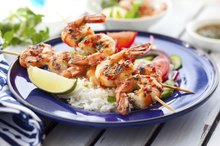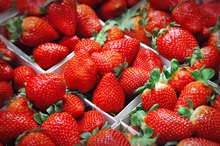What does fact checked mean?
At Healthfully, we strive to deliver objective content that is accurate and up-to-date. Our team periodically reviews articles in order to ensure content quality. The sources cited below consist of evidence from peer-reviewed journals, prominent medical organizations, academic associations, and government data.
- Diabetes: Sugar, Uric Acid, and the Etiology of Diabetes and Obesity
- Diabetes: Sugar, Uric Acid, and the Etiology of Diabetes and Obesity
The information contained on this site is for informational purposes only, and should not be used as a substitute for the advice of a professional health care provider. Please check with the appropriate physician regarding health questions and concerns. Although we strive to deliver accurate and up-to-date information, no guarantee to that effect is made.
Can Gout Sufferers Eat Baked Beans?
People with the form of arthritis called gout are typically told to limit or reduce their intake of dietary substances called purines. Beans have a relatively high purine content. However, the purine content of beans and other vegetables does not appear to aggravate gout symptoms, and people with gout can probably safely eat baked beans.
If you are experiencing serious medical symptoms, seek emergency treatment immediately.
Background
Purines are substances that help form the basic structure of your genes, and every cell in your body contains purine materials. A variety of common foods also contain at least some purines. When you eat purines, your body breaks them down and forms a substance called uric acid. In people with gout, uric acid builds up abnormally and triggers the formation of crystals that settle in the big toe and other joints and cause pain. Foods with a high protein content typically also have a relatively high purine content.
- Purines are substances that help form the basic structure of your genes, and every cell in your body contains purine materials.
- In people with gout, uric acid builds up abnormally and triggers the formation of crystals that settle in the big toe and other joints and cause pain.
Animal-Based Purines
Arthritis and Beans
Learn More
Gout symptoms are clearly associated with the consumption of animal-based proteins, which have an especially high purine content. Animal-based foods particularly linked to the worsening of gout include:
- pork
- lamb
- beef
- tuna
- scallops
- lobster
- shrimp
Other animal foods with notably high purine content include anchovies, herring, mackerel and organ meats like liver. According to a long-term study published in 2004 in the “New England Journal of Medicine,” men who consume diets rich in red meats and seafood have a 40 to 50 percent greater chance of developing gout than those who consume diets low in these foods 1.
Plant-Based Purines
Consumption of beans does not appear to trigger gout attacks, the authors of the study published in the “New England Journal of Medicine” report 1. In addition, consumption of other high-purine vegetables — including mushrooms, peas, spinach and cauliflower — is not related to any worsening of gout symptoms. People with gout should replace high-purine animal foods with beans and other plant-based proteins. In addition to potentially reducing gout-related symptoms, consumption of plant proteins can reduce your levels of saturated fat, which is indirectly linked to the onset of both gout and obesity.
- Consumption of beans does not appear to trigger gout attacks, the authors of the study published in the “New England Journal of Medicine” report 1.
- In addition, consumption of other high-purine vegetables — including mushrooms, peas, spinach and cauliflower — is not related to any worsening of gout symptoms.
Considerations
How to Shrink Fibroids & Cysts Naturally
Learn More
Consumption of sugar may directly increase your uric acid levels, according to the October 2013 issue of "Diabetes 2. Since baked bean recipes commonly contain some form of sugar, by logical extension, baked bean consumption may present some risks for people with gout. However, there is no scientific consensus on sugar’s uric acid-related effects. In addition to reducing your intake of animal proteins and increasing your intake of plant proteins, dietary steps you can take to reduce your gout symptoms or gout risks include increasing your water intake, eating low-fat or fat-free dairy, avoiding or limiting alcohol consumption and increasing your intake of complex carbohydrates. Consult your doctor for more information on the gout-related effects of beans and other plant-based proteins.
- Consumption of sugar may directly increase your uric acid levels, according to the October 2013 issue of "Diabetes 2.
- Since baked bean recipes commonly contain some form of sugar, by logical extension, baked bean consumption may present some risks for people with gout.
Related Articles
References
- New England Journal of Medicine: Purine-Rich Foods, Dairy and Protein Intake, and the Risk of Gout in Men
- Diabetes: Sugar, Uric Acid, and the Etiology of Diabetes and Obesity
- National Institute of Arthritis and Musculoskeletal and Skin Diseases. Gout. Updated April 2016.
- Zhang Y, Chen C, Choi H, et al. Purine-rich foods intake and recurrent gout attacks. Ann Rheum Dis. 2012; 71(9):1448-53. doi:10.1136/annrheumdis-2011-201215
- Fischer E. Ueber die Harnsauer. 1 [On Uric Acid. 1]. Berichte der Deutschen Chemischen Gesellschaft. 1884: 17:328-338. doi:10.1002/cber.18980310304
- Ragab, G., Elshahaly, M., & Bardin, T. (2017). Gout: An old disease in new perspective – A review. Journal of Advanced Research, 8(5), 495–511. doi:10.1016/j.jare.2017.04.008
- Centers for Disease Control and Prevention. Gout. Updated January 28, 2019.
- Zgaga, L., Theodoratou, E., Kyle, J., Farrington, S. M., Agakov, F., Tenesa, A., … Campbell, H. (2012). The Association of Dietary Intake of Purine-Rich Vegetables, Sugar-Sweetened Beverages and Dairy with Plasma Urate, in a Cross-Sectional Study. PLoS ONE, 7(6), e38123. doi:10.1371/journal.pone.0038123
- Choi HK, Gao X, Curhan G. Vitamin C intake and the risk of gout in men: a prospective study. Arch Intern Med. 2009;169(5):502–507. doi:10.1001/archinternmed.2008.606
- Zhang Y, Neogi T, Chen C, Chaisson C, Hunter DJ, Choi HK. Cherry consumption and decreased risk of recurrent gout attacks. Arthritis Rheum. 2012;64(12):4004–4011. doi:10.1002/art.34677
- Arthritis Foundation. Gout Diet: Dos and Don’ts.
- Boban M, Modun D. Uric acid and antioxidant effects of wine. Croat Med J. 2010;51(1):16–22. doi:10.3325/cmj.2010.51.16
- Caliceti C, Calabria D, Roda A, Cicero AFG. Fructose Intake, Serum Uric Acid, and Cardiometabolic Disorders: A Critical Review. Nutrients. 2017;9(4):395. Published 2017 Apr 18. doi:10.3390/nu9040395
- U.S. Department of Health and Human Services and U.S. Department of Agriculture. 2015–2020 Dietary Guidelines for Americans. 8th Edition. Published December 2015.
- U.S. Department of Health and Human Services. Gripped by Gout. NIH News in Health. Published February 2014.
- Kakutani-Hatayama M, Kadoya M, Okazaki H, et al. Nonpharmacological Management of Gout and Hyperuricemia: Hints for Better Lifestyle. Am J Lifestyle Med. 2015;11(4):321–329. Published 2015 Sep 2. doi:10.1177/1559827615601973
Writer Bio
M. Gideon Hoyle is a writer living outside of Houston. Previously, he produced brochures and a wide variety of other materials for a nonprofit educational foundation. He now specializes in topics related to health, exercise and nutrition, publishing for various websites.









